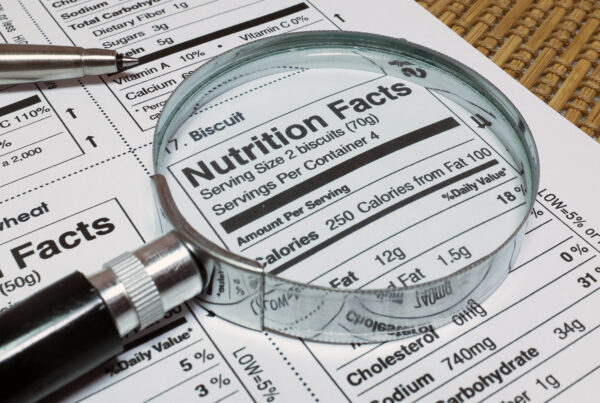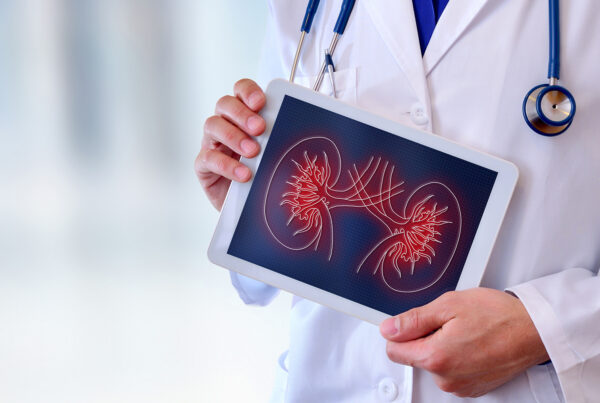Many patients don’t realize they have chronic kidney disease until it’s already Stage 3, meaning moderate loss of kidney function. Surprise and confusion are often the first reactions when diagnosed. Wrapping your head around kidney disease starts with understanding. This article is designed to give you the basic terminology, and to introduce the concept of a “Kidney Diet”, so you can eat in a way to lessen the progression of kidney disease.
There are five stages of chronic kidney disease, oftentimes, patients don’t have visible symptoms and are diagnosed when already at CKD Stage 3.
|
Stage |
Description |
Estimated Glomerular Filtration Rate (eGFR) |
|
Stage 1 |
Kidney damage (some protein in the urine) with normal GFR |
Greater than 90 |
|
Stage 2 |
Kidney damage with mild decrease in GFR |
60 to 89 |
|
Stage 3 |
Moderate decrease in kidney function |
30 to 59 |
|
Stage 4 |
Severe kidney damage |
15 to 29 |
|
Stage 5 |
Kidneys are close to failing or have already failed |
Less than 15 |
Understanding your particular stage of kidney disease is essential to understanding next steps. You can learn more about the stages of kidney disease from your doctor or online.
If you haven’t already, this is the time to do everything you can to slow the progression of Chronic Kidney Disease and lessen its adverse effects. If you have other conditions, it’s time to learn about those too. Learn about how those conditions affect kidney disease. Talk to your doctor about diabetes, high blood pressure, heart disease, cardiovascular disease, fluid retention, bone disease, muscle cramps, and obesity. Addressing these conditions should occur in conjunction with managing your chronic kidney disease.
Basic Kidney Health Terms
There are several key terms to know and understand when managing your kidney diet. Here are the basics:
- Blood Urea Nitrogen (BUN) When your body metabolizes protein, it produces urea. Your BUN is the the amount of nitrogen from urea, determined by a lab test. A high level of BUN is one of the symptoms indicating that the kidneys are not functioning well.
- Creatinine is a waste product that is filtered out of the blood by the kidneys and passed into the urine. If the amount of creatinine in the urine decreases, while the amount in the blood increases, this may signify that your kidneys are damaged and aren’t functioning well.
- eGFR indicates how much kidney function you have based on how well your kidneys filter waste and extra fluid out of your blood.
Understanding the relationship between diet and food with the help of a Registered Dietitian (RD)
Proper nutrition for someone with kidney disease is very different from someone with healthy kidneys. A registered renal dietician can help you establish a diet designed to preserve kidney function. It’s important that you think about your diet, and control your intake of certain nutrients as soon as possible. It’s helpful to think of your kidney diet as healthy foods you can eat, rather than a list of things you’re not allowed to enjoy anymore. A good dietitian will not only help you establish a diet that is right for you, they’ll help you feel good about your diet in relation to your health. But, with diet being essential to kidney health, building the right relationship with food is more important now than ever.
Your dietitian will help you:
- Understand what you can eat to slow the progression of kidney disease.
- Learn what you can substitute for no-longer-allowed foods.
- Learn to read food labels.
- Help you define a diet that will support your weight loss goals.
Make sure your RD has the proper credentials. Your doctor may have a recommendation for you. You can also find guidance at the National Institute of Diabetes and Digestive and Kidney Diseases.
A diet designed to improve your kidney health will control nutrients that improve or reduce kidney health. With your dietitian, discuss foods with the appropriate amount of nutrients including sodium, phosphorus, potassium, protein and water. We will discuss each of these in future blogs.







